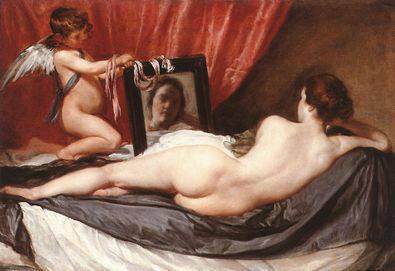
Diego de Velázquez: Venus at the mirror (London, National Gallery)
Velazquez major retrospective at the National Gallery in London
For the first time in Britain, a major exhibition will trace the career of one of the very greatest painters – Diego Rodriguez de Silva y Velázquez (1599-1660).
‘Velázquez’ will follow the artist from his beginnings in Seville, through his move to Madrid and appointment as court painter to Philip IV, his two trips to Italy, to his final days and his knighthood.
The National Gallery possesses the largest collection of Velázquez’s paintings outside the Museo del Prado, Madrid, and these nine works, along with seven others from British collections, will form the nucleus of this first, truly retrospective exhibition. These will appear in relation to eight major loans from the Prado, including the largest work in the show, the imposing ‘Apollo at the Forge of Vulcan’, and the sensitive portrait of the court dwarf, Francisco Lezcano.
Among the other generous loans from collections across the world, is a trio of rarely lent exquisite portraits painted towards the end of Velázquez’s career from the Kunsthistorisches Museum, Vienna, depicting the royal children: ‘Infanta Maria Teresa in Pink’, ‘Infanta Margarita in Blue’ and ‘Infante Felipe Prospero’. There is also the rarely seen sensuous and profoundly spiritual ‘Temptation of St Thomas Aquinas’ from the cathedral museum in Orihuela, Spain.
In total, the exhibition will include around forty works – almost half of the surviving works by Velázquez.
Throughout his life Velázquez demonstrated an increasingly precocious ability to observe and record reality. He achieved ever greater physical and psychological naturalism using ever more pronounced and elegant brushstrokes. Velázquez ultimately realised miraculous effects of illusion with an astounding, abbreviated technique.
Arranged over four rooms, this exhibition will demonstrate his extraordinary development through examples of his portraits, religious and mythological paintings. The exhibition will begin with an introduction to Velázquez in Seville, and will feature a selection of the ‘bodegone’ scenes (ordinary people in settings where food and drink figure prominently) – such as ‘The Waterseller of Seville’ (Apsley House, London) and ‘An Old Woman Cooking Eggs’ (National Gallery of Scotland, Edinburgh) – together with religious works (‘Adoration of the Magi’, Museo del Prado, Madrid) and portraits (‘Sor Jeronima de la Fuente’, Private Collection). These will lead on to Velázquez’s works before and after his first Italian trip in 1630, including ‘Pedro de Barberana y Aparregui’ (Kimbell Art Museum, Fort Worth, Texas).
Velázquez’s portrayals of the court life will include works that show their popular pursuits, such as hunting (‘Philip IV as a Hunter’, Museo del Prado, Madrid), with several examples of Velázquez’s great equestrian portraits, including ‘Baltasar Carlos in the Riding School’ (Private Collection).
The final room will showcase Velázquez’s later mythological paintings and portraits, a highlight being ‘Mars’ (Museo del Prado, Madrid) hanging alongside his legendary lover in ‘ The Toilet of Venus’ (‘The Rokeby Venus’) . 2006 marks the 100th anniversary of the acquisition of this painting by the National Gallery; Velázquez’s only surviving female nude entered the permanent collection thanks to the, then newly-founded, Art Fund.
The British started to collect Velázquez from the late 18th century, Sir Joshua Reynolds saying, ‘What we all do with labour, he does with ease.’ The technical freedom of Velázquez’s work made him an inspiration to generations of artists, including Sargent, Whistler, Picasso, Dali and Bacon. Velázquez is, declared Manet, ‘le peintre des peintres’ (‘painter of the painters’).
The exhibition is accompanied by a fully-illustrated catalogue (£35 hardback, £19.95 paperback) and a booklet (£5.95). There’s also the ‘Portrait of an Artist’ Film Season (23 September-11 November 2006).
Follow us on:

